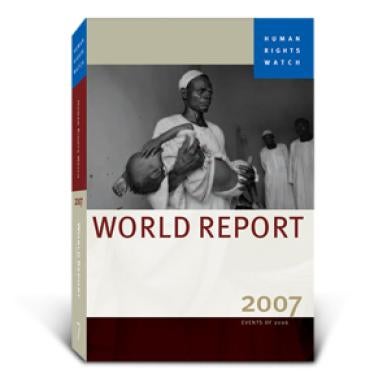(New York) - One year after launching the Afghanistan Compact, President Hamid Karzai’s government and its international backers have largely failed to meet the compact’s benchmarks on improving human rights and basic security, Human Rights Watch said. Members of the international community and the Afghan government will meet in Berlin on January 30 and 31 to assess their implementation of the Afghanistan Compact.
“Afghanistan hasn’t really met many of the benchmarks, particularly those addressing the well-being of the Afghan people,” said Sam Zarifi, Asia research director at Human Rights Watch. “Kabul and its international backers have made little progress in providing basic needs like security, food, electricity, water and health care.”
The United States, the European Union and other donors should provide greater economic, political and military assistance necessary to protect the human rights of Afghans, Human Rights Watch said. President Karzai’s government should improve the rule of law and hold militias and warlords accountable for abuses.
The Afghanistan Compact was agreed at an international conference held in London on January 31 and February 1, 2006. The compact identified three major areas of development for Afghanistan’s future – security, governance, and economic development. It established benchmarks for performance in each area, to be met by the Afghan government as well as international donors.
“Security is the first pillar of the compact, but tens of thousands of Afghans don’t feel safe enough to lead normal lives,” Zarifi said. “Life is so dangerous that many Afghans are unable to go to school, get health care, or take goods to market.”
More than 1,000 civilians were killed in 2006, many of them as a result of attacks by the Taliban and other anti-government forces in southern Afghanistan. In all, more than 4,400 Afghans died in conflict-related violence, twice as many as in 2005 and more than in any other year since the United States helped oust the Taliban in 2001. The United Nations estimated that the armed conflict displaced 15,000 families – about 80,000 people – in southern Afghanistan.
The international security effort in Afghanistan has been hobbled by insufficient resources and the failure to effectively address the security concerns of the Afghan population. Taking into account Afghanistan’s population and size, the 40,000 NATO and US-led coalition forces in the country are a small fraction of the security forces deployed in other recent post-conflict areas like the Balkans and East Timor. Many are limited by national laws to safe areas in Afghanistan or cannot act to protect ordinary Afghans adequately.
Human Rights Watch called upon NATO countries, as signatories to the Afghanistan Compact, to set up a financial compensation program for civilian death, injury or property damage resulting from NATO operations in Afghanistan. In 2006, NATO and coalition operations caused the deaths of at least 100 civilians and damaged the homes and livelihoods of hundreds of families.
“NATO’s mandate is to protect the Afghan people,” Zarifi said. “NATO should measure success by the number of children in school, the number of women who have access to health care, and the length of paved roads linking villages to markets.”
Human Rights Watch voiced concern over the slow progress on the program to disband illegal militias as stipulated in the Afghanistan Compact. The United Nations estimates that hundreds of illegally armed groups, many of them ostensibly allied with the government, continue to exercise power throughout Afghanistan. In many parts of the country, warlords and their militias have perpetrated serious human rights abuses such as illegal land grabs, intimidation of journalists, and factional and ethnic violence.
“Afghans are abused by both the Taliban and pro-government warlords,” said Zarifi. “Insecurity is not just confined to the south; it’s a serious problem for Afghans who live in the north and the west, away from the hotbeds of the insurgency.”
Human Rights Watch said the Afghan government also failed to meet the benchmarks for governance, rule of law and human rights. The slow progress toward establishing accountability strengthened the insurgency and undermined implementation of the compact, Human Rights Watch said.
“After three decades of suffering abuses, Afghans have repeatedly called for accountability for those responsible for serious human rights abuses, whether communists, warlords, or the Taliban,” Zarifi said. “There can be no sustainable peace and security in Afghanistan without respect for the rule of law.”
The compact requires the implementation of the Action Plan for Peace, Reconciliation and Justice, a five-year plan for implementing transitional justice in Afghanistan. President Karzai officially initiated the Action Plan on December 12, 2006.
On January 24, several members of Afghanistan’s lower house of parliament (the Wolesi Jirga) discussed granting themselves blanket immunity against accusations of perpetrating war crimes. The discussion was led by parliamentarians such as Abdul Rabb al Rasul Sayyaf, Burhanuddin Rabbani, and Taj Mohammad, all of whom have been implicated in war crimes or other human rights abuses.







